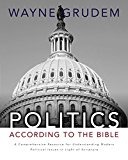Politics According to the Bible. By Wayne Grudem. Grand Rapids, MI: Zondervan, 2010. 624 pp. Cloth, $39.99.
In this book, Wayne Grudem seeks to answer the question, “what does the Bible say about politics?” More specifically, Grudem is primarily dealing not with basic political philosophies but specific issues in the modern American political scene (his political philosophies come out in their applications to these issues). The book is written from a socially very conservative and fiscally mostly-conservative viewpoint and Grudem is open and explicit about his support of the Republican Party and opposition to the Democratic Party (pp. 572-74).
This book has many strengths. First of all, the book has an attractive cover and an easy to understand title. The book is well organized and it contains a comprehensive table of contents and thorough indexes of Scripture, names, and subjects covered within. This book is quite comprehensive in dealing with all of the hot-button political issues of today. He makes solid arguments for many conservative viewpoints and effectively shows the error of many liberal viewpoints. I especially appreciate his effective coverage of the Protection of Life issue (chapter 6). The book also contains many charts and graphs which are easy to understand and successfully illustrate his points. This is especially true in chapter 10, “The Environment.”
The negatives are that it seems that Grudem has started with a system of politics and worked from there rather than starting with the Bible and working toward a political system. Grudem does quite a bit of proof texting and very little exegesis. Many times the proof texts offered have very little if anything to do with his point. For example, Grudem many times argues that the government should be very intrusive into people’s lives to enforce behavior that is consistent with Christian (and sometimes Jewish—he is inconsistent in his view that Christians are free from the Mosaic Law) morality, even in consensual issues that have no direct impact on others. In these cases, Rom 13:4 is often cited as justification for this view. This verse Book Reviews 127 is also cited to argue that governments should use taxes to pay for “playgrounds and parks where families can picnic and sports teams can practice and compete” and offer financial incentives to promote marriage (p. 80). This verse seems to be a catch-all proof text used to support any area where Grudem believes in government welfare (he is rather selective in this), any area where he believes in powerful government intrusion (which goes beyond what many Evangelicals would want), and even in his insistence that the Church, at least to some degree, has a social gospel that should cooperate with and influence government.
A substantial portion of the book is arguing for certain political policies from a logical standpoint rather than a biblical one. This is not necessarily a bad thing, and Grudem says in the introduction that he will do this (p. 19), but at times Grudem seeks to give the impression of biblical support for his view by citing only loosely related biblical verses. This greatly weakens his arguments. For example, in his argument that the government should use torture (which he calls inflicting “acute” and “significant” pain [p. 430-31]) as a means to extract information from terrorists, he cites passages about fathers disciplining their children and follows up by saying, “So how can there be moral objection to all infliction of pain to attempt to compel a right action?” (p. 430, italics his). It is certainly a stretch to apply passages about a father’s loving discipline of his children for their own good to say that the government should torture people and the argument would have been stronger if this were left out. There are many similar examples in the book.
Despite its shortcomings, however, the strengths far outweigh the weaknesses and I believe this book to be a fantastic tool for the discerning reader. I also hope that this book leads to more discussion about the topic, which it seems to already have done. And finally, I would love to see this prompt someone to do a similar book that is based upon more solid hermeneutics and fuller exegesis. It is unlikely that many people will agree with every point made in the book, and neither do I. So while I would caution the reader to read critically, I do recommend that Christians and concerned citizens get it, read it, interact with it, and use it as a tool to sharpen their own views on politics, as we are called to take “…every thought into captivity to the obedience of Christ” (2 Cor 10:6).
Grant Hawley
Pastor
Grace Bible Church
Allen, TX

